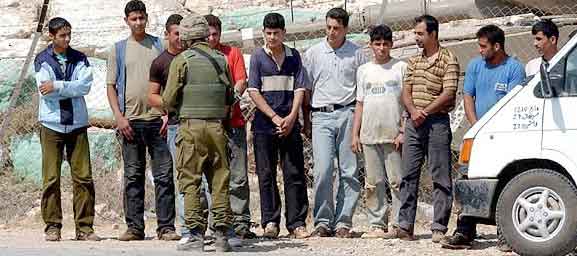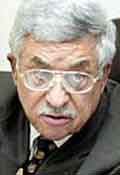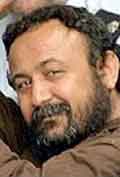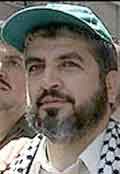| JERUSALEM, — Palestinian officials
predicted today that the militant group Hamas would soon agree to halt
violence against Israel temporarily, acceding to a request from the Palestinian
prime minister and to international pressure.
Two tracks of negotiation by Prime Minister Mahmoud Abbas — with Israel and with Hamas — appeared to be converging. Israeli and Palestinian security officials met today and reported some progress toward determining how Palestinian security forces would assume control from Israeli troops for policing the West Bank city of Bethlehem and parts of the Gaza Strip.
Marwan Barghouti, a rising leader of Yasir Arafat's Fatah movement who is imprisoned by Israel, has been instrumental in seeking a cease-fire. Last week he sent two representatives to Damascus, Syria, to meet with Khaled Mashal, a top Hamas official, and Ramadan Abdullah Shallah, a leader of Islamic Jihad, one of the envoys said.
Still lacking popular support, Mr. Abbas enlisted Mr. Barghouti as part of a strategy for ending the current uprising without internal Palestinian violence while focusing international pressure on Israel for concessions. Egypt, too, has been pressing Mr. Mashal to agree to a truce. Officials of Hamas said today that a final decision would be reached by the group's leaders in the West Bank and Gaza, in Israeli prisons and in Damascus. The Hamas men are expected to convey their decision to Cairo rather than to Mr. Abbas, whose authority and intentions they continue to question. Mr. Mashal and Mr. Shallah are expected in Cairo on Tuesday for meetings with Egyptian and Fatah officials. Palestinian officials have confidently and wrongly predicted an imminent cease-fire before, and important questions remained unresolved tonight. Some Palestinian officials said they expected Hamas to endorse a truce unconditionally. But Qadoura Fares, one of Mr. Barghouti's envoys to Damascus, said he thought Hamas would condition any cease-fire on the release of Palestinian prisoners and a halt to killings by Israel of Palestinians it accused of being terrorists. Prime Minister Ariel Sharon has suggested that Israel would stop using such military measures only in areas where Palestinian security forces actively worked to stop Palestinian violence. An agreement giving security control to Palestinian forces in Bethlehem and the Gaza Strip, the areas under discussion as a first step, would not prevent soldiers from acting in the West Bank outside Bethlehem, Israeli officials said. "We are free to fight terror wherever the Palestinians are not doing it," said Gideon Meir, the deputy director general of the Israeli Foreign Ministry. On Saturday night Israeli forces killed Abdullah Qawasmeh, 43, a Hamas leader in the West Bank city of Hebron. Tonight Israeli forces conducted another raid, in the West Bank city of Nablus, in what the army called a search for terrorists. [Early Tuesday, a spokesman for the Israeli Army said it had arrested more than 100 Palestinians in Nablus in a major sweep against Hamas, Agence France-Presse reported.] Israel is demanding that Mr. Abbas and his security chief, Muhammad Dahlan, arrest members of Hamas and collect its illegal weapons, by force if necessary. But allies of the two men say that for now they lack the political strength to take such action, and so they are relying on persuasion. Like Mr. Abbas, Mr. Barghouti has no control over Hamas or Islamic Jihad. But he commands some respect as a powerful member of Fatah whose reputation has only been enhanced by his imprisonment. Israel arrested Mr. Barghouti more than a year ago, and it is now trying him as a terrorist responsible for 26 Israeli deaths. He rejects the charges, saying he is only a political leader. A canny, popular leader who speaks fluent English and Hebrew, Mr. Barghouti, who had close ties to Israelis before the conflict began in September 2000, is mentioned as a possible successor to Mr. Arafat. Mr. Fares, a Palestinian legislator who is also a Fatah leader, went to Damascus last Monday with Muhammad Horani, another legislator, carrying a message from Mr. Barghouti. Mr. Fares said they had held meetings with the other Palestinian factions and returned on Friday. He said they had informed Mr. Arafat and Mr. Abbas of their mission, and periodically spoken with Mr. Abbas by telephone. They were in touch with Mr. Barghouti through lawyers, Mr. Fares said. He said Mr. Barghouti's message was that "it's not wrong to give the Palestinian government a chance and to declare a truce." Mr. Barghouti's basic argument, he said, was that the Israeli government did not want peace or negotiation, and that a Palestinian cease-fire would eliminate any international criticism that "the Palestinian people are always the obstacle." Mr. Fares said the two legislators had discussed many of the same developments that Mr. Abbas had raised with Hamas leaders in Gaza, including the American presence in Iraq, the new international peace plan known as the road map and what he called "the international and Arab reality." But Mr. Fares said the militant leaders had rejected the peace plan and had expressed "no confidence that there is an international party that is ready to provide assurances that Israel will cease its military activities." A few days ago, some Palestinian officials spread the word that Israel was preparing to release Mr. Barghouti, its most prominent prisoner. Some of his allies now call those rumors an attempt by Israeli and Palestinian opponents of a cease-fire to undermine it by making Mr. Barghouti appear self-interested in advocating a truce. Almost a month ago, Mr. Abbas said he expected a truce from Hamas within a week. The deal fell apart after a peace conference in Aqaba, Jordan, at which Mr. Abbas called for a halt to all Palestinian violence against Israel. Hamas leaders said that he had betrayed the Palestinian uprising, and that they feared he would not honor promises that they said he had made to them privately not to arrest Hamas members or to confiscate their weapons. Israeli and Palestinian officials now appear to be in essential agreement on a transfer of responsibility for security in Bethlehem, and to be making progress on Gaza. They are to meet again on Tuesday night.
|




